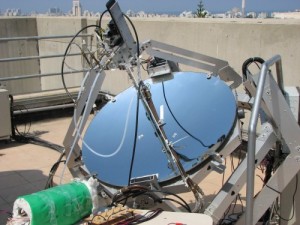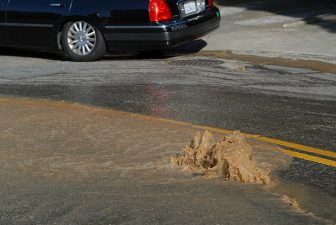 Learning a lesson from the BP workers who kept silent about Deepwater Horizon’s inevitable burst, Dead Sea Workers speak out. And one is putting it on film.
Learning a lesson from the BP workers who kept silent about Deepwater Horizon’s inevitable burst, Dead Sea Workers speak out. And one is putting it on film.
The BP workers from the Gulf of Mexico kept quiet about the foreboding well disaster for years until the Deepwater Horizon burst and became North America’s largest ecological catastrophe ever. To most of us, that’s a sad story, but not all that relevant.
My name is Solomon Isaac Goodman. I grew up on the ocean and I’ve spent most of my life sailing around the world. Four years ago I was hired as a captain on the Dead Sea. I had sailed the Pacific, the Atlantic, the Med and the Red, had crossed canals like the Suez and Panama, and sailed through hurricanes, but nothing prepared me for what I was going to find out about the Dead Sea.
Scathing salts
A week into the job, I sailed across Evaporation Pond #7 at 05:14 am to pick up a crew member, and I felt as if I was crossing the river styx. I had been familiar with the Dead Sea for most of my life, but didn’t realize what was going on there. Soon, I began to see how things are 415 meters below sea level.
The Dead Sea was, in its better years, a large basin running for nearly 70 kilometers from southeast of Jericho to the tip of Mount Sodom. Today, the real size of the Sea is only half of that, with the entire southern part being dammed off to create evaporation ponds.
The water is pumped from the sea to the ponds, where evaporation is encouraged to bring a more concentrated solution to the industry laying at the southern end. Throughout most of the Dead Sea the water, at 30% salinity, is packed with healthy minerals that do wonders for troubled skin; in the evaporation ponds, I sit on the eastern dock washing off a day-old scrape on my leg I got from walking on the salt formations.
The Dead Sea “solution”
The highly concentrated water in the evaporation ponds isn’t called “water” anymore. Instead it’s referred to as “solution.” It’s a dense solution of minerals and salts that kills anything it touches. Making its way into the scrape on my leg, it loses its healthy attributes and digs a hole in my shin.
Wondering how this pantheon of health had lost its appeal and began seeping under my skin, I learned that the Dead Sea is one of the world’s largest suppliers of potash, and that it also produces industrial materials like aluminum, magnesium and several kinds of acids. While all of these are found in smaller concentrations in the Dead Sea, they are much more abundant in the evaporation ponds.
Altogether, I spent nearly a year working on Evaporation Pond Number 7. We would wake up early in the morning and spread half a ton of dynamite over the salt flats. The explosion would soften up the flats and we would plow through it with our hundred foot dredgers. Year after year, the ponds are dredged and more water is brought in from the sea, it evaporates, the sediment sets, and we come around again.

Sets sail the little vessel of my mind
and henceforth better waters furrowing
leaves such a cruel ocean far behind
–Dante Alighiere
For several years that routine caused a gradual recession in the sea level, but since the Jordan river was dammed off for drinking water over ten years ago, the Dead Sea’s main water supply was cut off, causing the level to drop at twice the speed.
BP Inspires Action
As I read about the BP disaster, and as their crude oil blackened the Gulf of Mexico, I knew that the oil rig workers had covered up for their employers for years. They knew that the situation wasn’t safe, and probably far from it. Coming from dilapidated old towns strewn throughout Alabama, Louisiana and Mississippi, the oil rig jobs gave them financial security that is not readily found in those areas. As I read further, I realized that in the initial explosion, eleven workers were killed on “Deepwater Horizon.”
Realizing that, I went back to the Dead Sea, this time with a camera. Like the oil rig workers in the Gulf of Mexico, my crewmates too come from unstable backgrounds. The salaries on the Dead Sea are average in any big city, but for the small towns they come from, largely underdeveloped towns spread through the Negev desert, those salaries are too much to give up.
Looking at what happened in the Gulf of Mexico, Isaac and his crew want to speak out. They want to tell the world what they have been doing on the Dead Sea for 35 years.
Talking out of financial security
For some, it’s hard talking about the dilapidated state of the Dead Sea. Losing such an income for them means looking for a job in a town with 20% unemployment. Talking to the crew of the dredger “Maria” down on the Dead Sea, I asked if they know that eleven workers were killed in the event leading to the BP environmental disaster. A long silence followed. Isaac Karkovski, a dredger master who has been working there for 35 years, broke the silence saying it’s not too late.
Isaac worked on the Dead Sea when the 2 basins separated and the southern part was divided into evaporation ponds. He built the first pump that brought water from the sea to the ponds, and he has built three since then, to keep up with the rapidly dropping sea levels.
Mining can be sustainble
According to Isaac, “there are several solutions to the current situation without stopping the mining or the dredging, but if put off, we’ll be long gone and the newspapers will be talking about environmental disaster. If we speak out now, we can hold on to our jobs … but we’ve got to speak out now.”
To bring their story to the screen, I’ve set up a fundraising profile on Kickstarter.com and I’m spending more time than ever on the Dead sea these days. I’m following my friends in what they say are the last days of the Dead Sea making a movie called “Salt of the Earth.”
It’s the story of the Dead Sea from the eyes of the men who know it better than anyone else. They have something to tell you, before it’s too late.
Solomon Isaac Goodman is a guest contributor to Green Prophet. He is making about the environmental destruction at the the Dead Sea – in a new movie Salt of the Earth (currently looking for funding).
More news from the Dead Sea
Despite Everything, Shrinking Dead Sea is a Popular Tourist Destination
Protect The Middle East’s Natural Wonders – Vote Today!
Environmentalists Say “No, No!” To Red-Dead Canal
:: Top image via goldberg




Dear Steve (previous post)
I’m a sailor, I want to make a movie telling the general public what I know, they don’t and should definitely worry them, and I need to raise $4,500 in the next two weeks to move on to the next stage in planning the film.
If you’re worried enough to write foolish remarks in the talkback section I wonder if you’re able enough to contribute to a film thats main goal is to move the public to petitioning.
Sincerely,
Sol Goodman
Dead Sea.
I suggest that instead of exploiting the dangers at the Dead Sea for making money with movie funding, etc. Someone petition the public and really do the work necessary to make changes for the benefit of all of us. Making money on the backs of the pain and suffering of the people involved is a crime against humanity in my humble opinion.
Mr. Goodman:
I admire your enthusiasm. But I suggest that enthusiasmn and banner waving is not enough. First you need to understand something of the technology you are attacking. Your writing shows that you don’t. You dont use the correct terms, clearly dont understand the terms you use, and dont understand the process going on in the chain of ponds. You dont understand the contribution the reduced inflow of the Jordan plays in the problem. Forget the dams. Get yourself a technical advisor who will help you understand the problem so that you can direct your attack to the critical problem.
Nahum.
Mr. Goodman,
I applaud your speaking out on the unsafe conditions and unfolding distaster of the destruction of the Dead Sea. I encourage you to speak with Adamm Teva VDin as well as the Mins of Environment- especially with your proposed solutions, as that will make for a stronger case for change than just suggesting to stop the process completely.
I also suggest a social media campaign on this issue to raise awareness and support. Facebook, Twitter etc- I am sure we would all support your serious efforts in this cause. Behatzlacha- and thank you-
Shoshanna